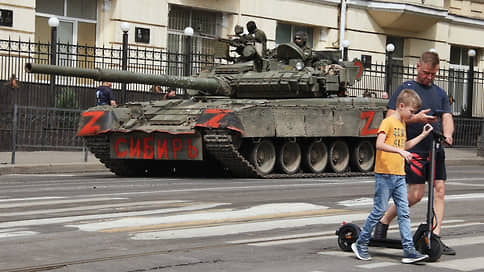What training manuals were given to United Russia about the rebellion of PMC “Wagner”
[ad_1]

State Duma deputies from United Russia (ER) received regular recommendations on working with voters during the regional week. They are opened by the theme of the successful confrontation of the authorities against the Wagner PMC rebellion: party members are recommended to emphasize the consolidation of society, the army and the country’s leadership, as well as the fact that the problem was solved without bloodshed. At the same time, the attention of citizens is also recommended to be drawn to the EP people’s program, summer employment programs for teenagers and the celebration of the Day of Love, Family and Fidelity.
State Duma deputies from United Russia received party recommendations on communicating with voters on the eve of the regional week from June 3 to June 9 (available to Kommersant).
The list of theses on the special military operation (SVO) opens with a statement about the unconditional leadership and popular support of President Vladimir Putin, whose decisions, according to United Russia, always lead to victories. In the case of the Wagner PMC rebellion, according to the materials, the victory was won without bloodshed.
The deputies are invited to explain that the consolidation of Russians around the figure of the president played a key role in suppressing the rebellion.
In the same context, it was noted that people who put “momentary grievances, discontent and ambitions” above the interests of their homeland cannot consider themselves patriots: “They are criminals!” Finally, party members are invited to convey to the electorate that at the moment “when decisive battles flare up at the front”, any actions that can destabilize the situation are not only a “knife in the back of the army”, but also contempt for the interests of all Russians.
Further, parliamentarians are traditionally reminded of the importance of comprehensive support for military personnel (from cash payments and assistance to families to front-line support). The deputies are recommended to participate in the events for the assembly and dispatch of humanitarian cargo, as well as to facilitate the purchase of equipment and ammunition necessary for the fighters.
The EP People’s Program also retains its traditional place in the recommendations. It is proposed to draw the attention of voters to the fact that it is being implemented in full, despite the difficult economic conditions provoked by the sanctions. The deputies should also talk about their work to ensure that the provisions of the project (social gasification, construction of schools, hospitals, renovation of dormitories, etc.) are included in the budgets of the regions “in full”. “The last significant changes in the “People’s Program” was the appearance of two fundamentally new sections devoted to the integration of new regions into Russia and the development of tourism,” the drafters of the document recall.
Deputies are also offered to carry out a “party landing” at enterprises where teenagers earn extra money.
The work of the party on the issues of summer employment of minors, as indicated in the recommendations, is a response to the requests of parents, employers and the children themselves, “who are ready to spend summer time with benefit.” Parliamentarians are invited to collect feedback from such workers, as well as talk about EP projects aimed at “improving the recruitment procedure and creating comfortable working conditions” for them.
Another reference point, potentially interesting for young people, is the celebration of the Day of Love, Family and Fidelity. The holiday is important in the context of cultural opposition to Western trends, as well as the concern of the authorities for the preservation of “primordial family traditions”, the deputies are told. They are also invited to participate in timed party events and congratulate couples on the streets.
In this case, special attention should be paid to couples celebrating a round wedding anniversary (50, 60 years), as well as families of CBO participants.
The “young people” should be presented with sweet sets and bouquets of daisies (a symbol of the holiday), and also be reminded that the EP considers the “budgetary filling of initiatives related to family support and their further development” (maternity capital, child benefits, etc.) .
The document concludes with a reminder that the primary theme of the receptions from 3 to 9 July is social issues. The deputies are explained that public receptions help to collect information directly “from the ground” (including how things are going in a particular region with the implementation of the People’s Program), and are reminded that this year this party institute will celebrate its 15th anniversary.
[ad_2]
Source link








